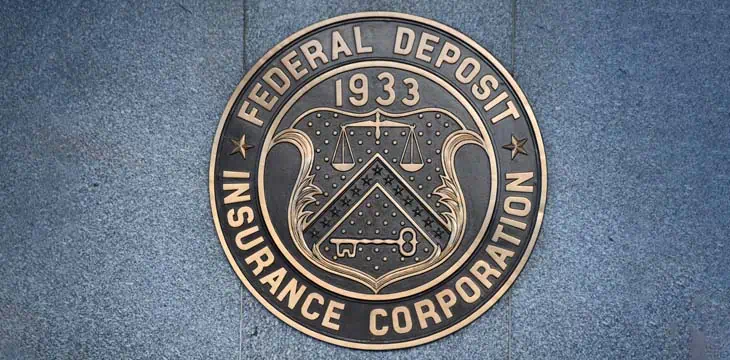|
Getting your Trinity Audio player ready...
|
A report from the U.S. Office of the Inspector General recommended the Federal Deposit Insurance Corporation (FDIC), an agency supervising financial institutions, implement digital asset risk assessments and update its feedback process for firms involved in digital asset activity.
The FDIC, an independent agency that insures deposits and supervises financial institutions in the U.S., was tasked with working on its risk assessment of the digital asset industry.
In an October 18 report on ‘Strategies Related to Crypto-Asset Risks’ published by the Office of the Inspector General, which oversees the FDIC, the agency was given two recommendations with regard to digital asset supervision, which it agreed to follow.
“We determined that the FDIC has started to develop and implement strategies that address the risks posed by crypto assets. However, the Agency has not assessed the significance and potential impact of the risks,” said the announcement.
“Specifically, the FDIC has not yet completed a risk assessment to determine whether the Agency can sufficiently address crypto-asset related risks through actions such as issuing guidance to supervised institutions.”
The Inspector General’s report noted that the “significant volatility” of the digital asset market in recent years may impact the FDIC’s mission to maintain stability and public confidence in the financial system “if material exposure of financial institutions to the risks posed by crypto-related activities were to manifest.”
This could reportedly be counteracted by implementing strategies that address the risks posed by digital assets. Specifically, the Office of Inspector General recommended:
- To establish a plan with timeframes for assessing risks pertaining to digital asset-related activities and;
- To update and clarify the supervisory feedback process related to the FDIC review of supervised institutions’ digital asset-related activities.
“The FDIC concurred with both recommendations and plans to complete corrective actions by January 30, 2024,” said the report, which, coincidentally, comes just a week after the U.S. Federal Trade Commission (FTC) settled a lawsuit with bankrupt digital asset company Voyager, who’s misdeeds included falsely claiming that customers’ accounts were insured by the FDIC.
Voyager claims
Voyager, a digital asset lender that let its users invest in over 100 digital currencies, filed for bankruptcy in July 2022, citing volatile crypto prices and the bankruptcy of Three Arrows Capital (3AC), a digital asset hedge fund that owed Voyager $650 million. Many saw it as another ‘victim’ of “the crypto contagion” that came in the wake of the Spring 2022 TerraUSD scandal.
The FTC began investigating Voyager for deceptive marketing practices in September, and on October 12, the consumer protection agency announced a settlement with the company.
In the federal court complaint, the FTC claimed that from at least 2018 until it declared bankruptcy in July 2022, Voyager and its former CEO, Stephen Ehrlich, falsely promised that customers’ accounts were insured by the FDIC and thus were “safe.” When the company failed, consumers lost access to significant assets and were locked out of their cash accounts for more than a month, with over $1 billion in digital assets lost.
The settlement permanently banned Voyager from offering, marketing, or promoting any product or service that could be used to deposit, exchange, invest, or withdraw any assets. The company also agreed to a judgment of $1.65 billion, which will be suspended to permit it to return its remaining assets to consumers in the bankruptcy proceedings.
Former executive Ehrlich did not agree to a settlement, and the FTC’s case against him will proceed in federal court on the charges of false representation. At the same time, the U.S. Commodity Futures Trading Commission (CFTC) filed separate civil charges against Ehrlich for fraud and failure to register with the CFTC concerning Voyager’s digital asset lending program.
Watch Digital currency & global compliance: Tools & tips for exchanges, wallets & other service providers

 07-06-2025
07-06-2025 





